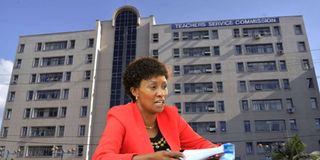Lawmakers call for review of teacher recruitment method

Teachers Service Commission Chief Executive Officer Nancy Macharia. MPs have protested against the distribution of teachers being recruited.
MPs have protested against the distribution of teachers being recruited, saying it disenfranchises regions with a high number of schools.
The lawmakers have told the Teachers Service Commission (TSC) that the pro-rata method they are currently using is not supported by the staff gaps in various constituencies.
Pro-rata is a process where whatever is being allocated is distributed in equal portions. In the ongoing hiring of teachers, all the 47 counties have been allocated 21 positions, a move MPs termed unfair, saying the counties have different needs and gaps.
The MPs now want the TSC to consider population and the number of wards and schools in a constituency while allocating slots to each of the counties.
The National Assembly Committee on Education says the method in use should be reviewed to factor in a number of dimensions currently ignored.
“The only fair thing to do here is to consider population, number of wards, number of schools in a sub-county and the number of existing teachers,” Lugari MP Nabii Nabwera said.
Malava MP Malulu Injendi said it is unfair to give Kakamega the same number of teachers, despite the county having 12 sub-counties with many schools.
“You cannot tell me that Kakamega County with 12 sub-counties will get the same number of teachers as a county with less than six sub-counties; how fair is that?” he asked.
Igembe North MP-Julius M’anaiba also termed the distribution method unfair as it disadvantages populous counties.
“In Meru County, there are 13 sub-counties, yet it will get the same share with a neighbouring county—which I don’t want to mention—with a small population and number of schools. There has to be a formula that does not disadvantage other counties,” Mr M’anaiba said.
Kabondo Kasipul MP Eve Obara said a review of the policy would help in having many teachers in some areas while other regions continue to suffer.
Marakwet West MP Timothy Kipchumba said the TSC should have consulted the committee first on the best recruitment method before embarking on the process.
The MPs now want the employer to compile a list indicating teacher shortages per county to inform future distribution.
However, TSC chief executive Nancy Macharia told MPs that the same committee approved the pro-rata method. “The method we are using at the moment was approved by this committee and some of you were members, so if members feel it should be changed, then you have the powers and for us we will just implement what you said,” she said.
Ms Macharia said they had been using the method being proposed but it raised a lot of issues with some regions complaining about skewed recruitment as some were getting more teachers than others. “If you want us to go back to the earlier method, then as a commission we are being overseen by this committee and will just implement what you tell us,” she said.
The commission said it has 9,000 vacancies on permanent and pensionable terms in secondary schools and another 1,000 in primary schools. It will also recruit 21,550 interns in junior secondary schools and another 4,000 for primary schools.
According to the roadmap provided by the commission, the generation of applicants list, the shortlisting of the county selection panel and invitation for interviews will start on Tuesday next week and run for seven days. The county recruitment process will start on January 5 and end on January 20, 2023.
The vetting at county level, the handling of complaints, the signing of internship agreements, the issuance of internship letters and the signing of employment letters will be done on January 12–20. The new teachers and interns will report to their workstations on January 23 when schools reopen for the first term.




